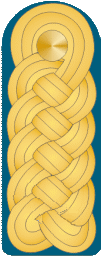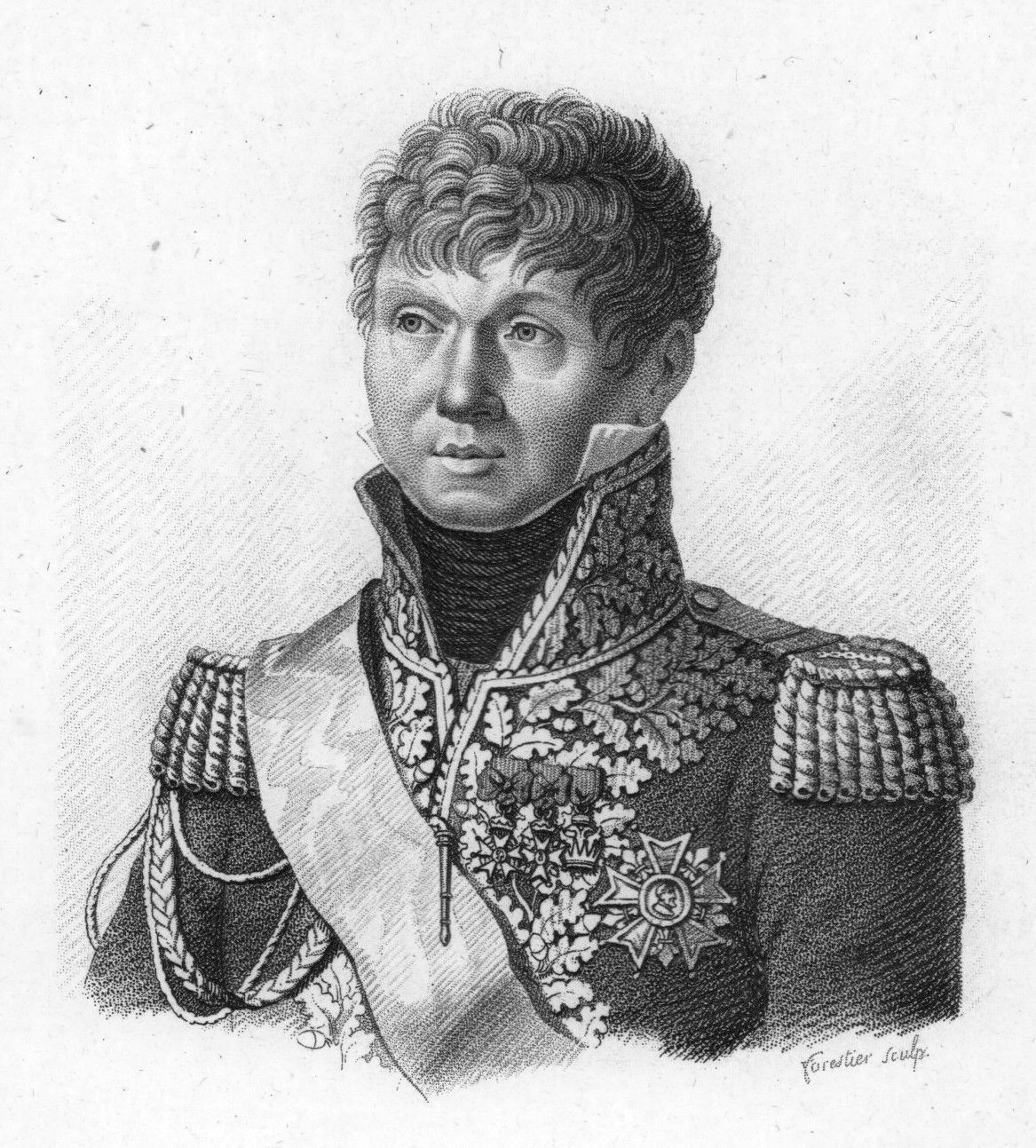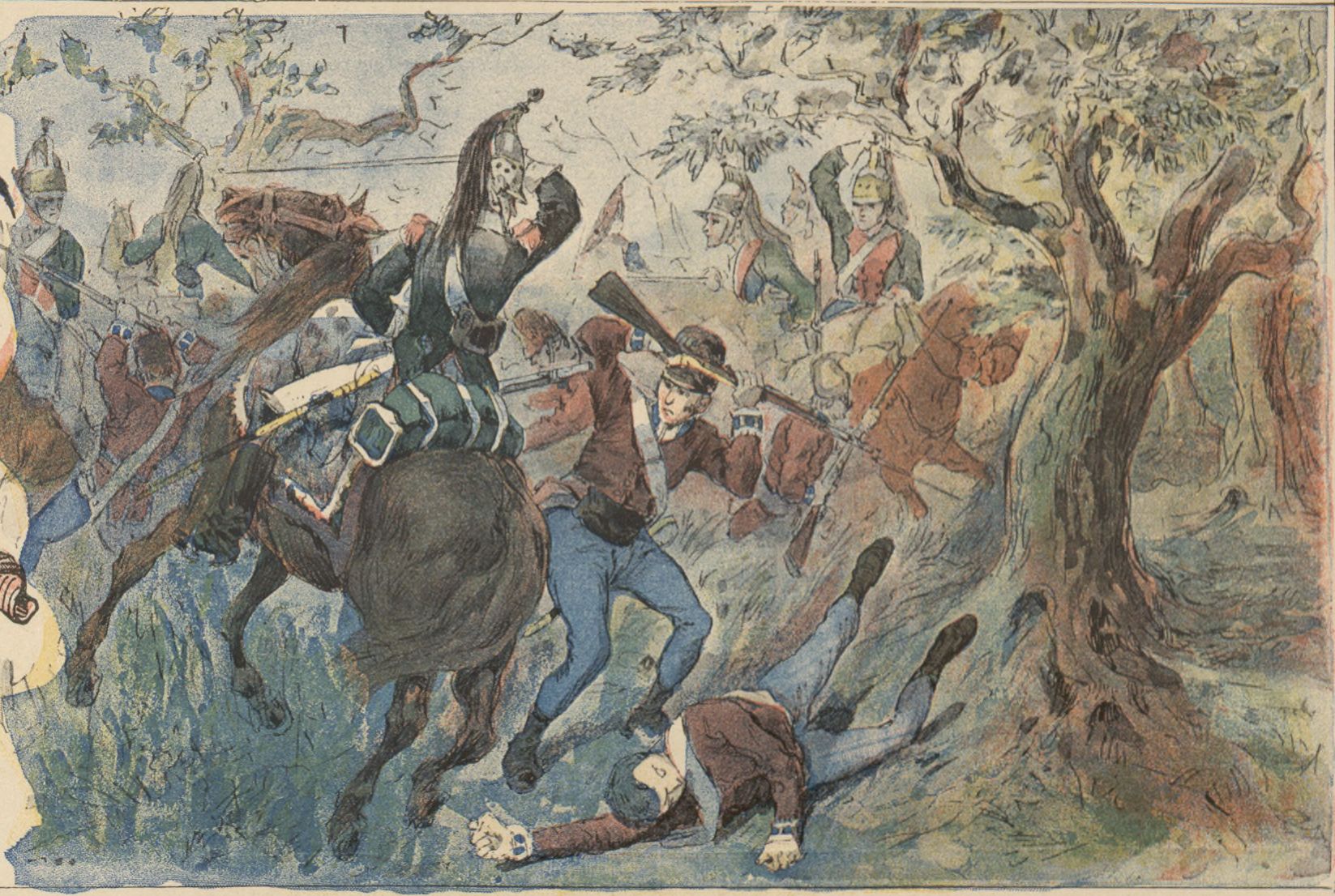|
Battle Of Baza (1810)
In the Battle of Baza on 4 November 1810 an Imperial French force commanded by General Milhaud fought a Spanish corps led by General Blake. When the Spanish commander allowed his forces to get spread out, Milhaud attacked with his cavalry and crushed Blake's vanguard with heavy losses. The Spanish force retreated into the province of Murcia. Baza is located on Route 342 about north of Almería. The battle occurred during the Peninsular War, part of the Napoleonic Wars. After King Joseph Bonaparte's army overran Andalusia, it meant that he had increased the territory his soldiers had to defend. French Marshal Soult's three corps were kept busy fending off constant Spanish and British threats to the province from land and sea. At Baza, the French successfully drove away one Spanish column. Within a few months, there would be another clash at Barrosa. Background On 18 and 19 November 1809, the main Spanish army suffered a catastrophic defeat at the Battle of Ocaña. A week la ... [...More Info...] [...Related Items...] OR: [Wikipedia] [Google] [Baidu] |
Peninsular War
The Peninsular War (1807–1814) was the military conflict fought in the Iberian Peninsula by Spain, Portugal, and the United Kingdom against the invading and occupying forces of the First French Empire during the Napoleonic Wars. In Spain, it is considered to overlap with the Spanish War of Independence. The war started when the French and Spanish armies invaded and occupied Portugal in 1807 by transiting through Spain, and it escalated in 1808 after Napoleonic France occupied Spain, which had been its ally. Napoleon Bonaparte forced the abdications of Ferdinand VII and his father Charles IV and then installed his brother Joseph Bonaparte on the Spanish throne and promulgated the Bayonne Constitution. Most Spaniards rejected French rule and fought a bloody war to oust them. The war on the peninsula lasted until the Sixth Coalition defeated Napoleon in 1814, and is regarded as one of the first wars of national liberation. It is also significant for the emergence of larg ... [...More Info...] [...Related Items...] OR: [Wikipedia] [Google] [Baidu] |
Almería
Almería (, , ) is a city and municipality of Spain, located in Andalusia. It is the capital of the province of the same name. It lies on southeastern Iberia on the Mediterranean Sea. Caliph Abd al-Rahman III founded the city in 955. The city grew wealthy during the Islamic era, becoming a world city throughout the 11th and 12th centuries. It enjoyed an active port that traded silk, oil and raisins. Etymology The name "Almería" comes from the city's former Arabic name, ''Madīnat al-Mariyya'', meaning "city of the watchtower". As the settlement was originally port or coastal suburb of Pechina, it was initially known as ''Mariyyat al-Bajjāna'' (''Bajjāna'' being the Arabic name for Pechina). History The origin of Almería is connected to the 9th-century establishment of the so-called Republic of Pechina (Bajjana) some kilometres to the north, which was for a time autonomous from the Cordobese central authority: the settlement of current-day Almería initially developed as ... [...More Info...] [...Related Items...] OR: [Wikipedia] [Google] [Baidu] |
IV Corps (Grande Armée)
The IV Corps of the ''Grande Armée'' was a French military unit that existed during the Napoleonic Wars. It consisted of several different units and commanders. War of the Third Coalition The corps was formed in 1805, with Marshal Jean-de-Dieu Soult being appointed as its commander.Chandler, 417. The IV Corps formed part of the extended center of the French line at the Battle of Austerlitz in December 1805.Chandler, 31. During the battle, Napoleon ordered Soult to attack the Pratzen Heights, from which the Allies had been attacking the French right wing. Repeated attacks from the Russians under General Kutuzov almost broke through the line of IV Corps, but aid from Marshal Jean-Baptiste Bernadotte's I Corps allowed the French to maintain their control of the Heights. The survivors then moved south and enveloped General Friedrich Wilhelm von Buxhoeveden's column, sending the Allies into a retreat.Chandler, 35. War of the Fourth Coalition The corps formed the right wing of ... [...More Info...] [...Related Items...] OR: [Wikipedia] [Google] [Baidu] |
Horace François Bastien Sébastiani De La Porta
Horace François Bastien Sébastiani de La Porta ( co, Oraziu Francescu Bastianu Sebastiani di A Porta; 11 November 1771 – 20 July 1851) was a French general, diplomat, and politician, who served as Naval Minister, Minister of Foreign Affairs, and Minister of State under the July Monarchy. Having joined the French Revolutionary Army in his youth, Sébastiani rose through its ranks before becoming a supporter of Napoleon Bonaparte. Sébastiani was the French Consulate's emissary to The Levant, notably drafting plans to reconquer Ottoman Egypt, and later served as the Empire's Ambassador to The Porte. In the latter capacity, he attempted to increase French influence and signaled pro- Russian activities in the Danubian Principalities, thus provoking the War of 1806–1812. In 1807, Sébastiani organized the defense of Constantinople during the Dardanelles Operation. Recalled due to British pressure after the deposition of Selim III, he served in the Peninsular War an ... [...More Info...] [...Related Items...] OR: [Wikipedia] [Google] [Baidu] |
General Of Division
Divisional general is a general officer rank who commands an army division. The rank originates from the French (Revolutionary) System, and is used by a number of countries. The rank is above a brigade general, and normally below an army corps general. The rank is mostly used in countries where it is used as a modern alternative to a previous older rank of major-general or lieutenant-general. Specific countries Brazil The Brazilian rank ''general-de-divisão'' translates literally as "general of division", and is used by the army. This rank is equivalent to lieutenant-general. The air force equivalent is ''major-brigadeiro''(literally "major-brigadier"). The navy equivalent is ''vice-almirante'' (literally, vice-admiral) Chile The Chilean rank ''general de división'' translates literally as "general of division", and is used by the army. This rank is equivalent to lieutenant-general. The air force equivalent is ''general de aviación'' (literally "aviation general"). Thes ... [...More Info...] [...Related Items...] OR: [Wikipedia] [Google] [Baidu] |
Dragoon
Dragoons were originally a class of mounted infantry, who used horses for mobility, but dismounted to fight on foot. From the early 17th century onward, dragoons were increasingly also employed as conventional cavalry and trained for combat with swords and firearms from horseback. While their use goes back to the late 16th century, dragoon regiments were established in most European armies during the 17th and early 18th centuries; they provided greater mobility than regular infantry but were far less expensive than cavalry. The name reputedly derives from a type of firearm, called a ''dragon'', which was a handgun version of a blunderbuss, carried by dragoons of the French Army. The title has been retained in modern times by a number of armoured or ceremonial mounted regiments. Origins and name The establishment of dragoons evolved from the practice of sometimes transporting infantry by horse when speed of movement was needed. In 1552, Alexander Farnese, Duke of Parma ... [...More Info...] [...Related Items...] OR: [Wikipedia] [Google] [Baidu] |
I Corps (Grande Armée)
The I Corps of the ''Grande Armée'' was a French military unit that existed during the Napoleonic Wars. Though disbanded in 1814, following the Treaty of Fontainebleau (1814), Treaty of Fontainebleau, it was reformed in April 1815 following the return of Napoléon during the Hundred Days. During the Hundred Days, the corps formed part of the quickly re-formed Army of the North (France), Army of the North. Campaigns During the mobilisation by Napoléon in 1803, and the subsequent ordnance reforming the army, the new "Army of Hanover or ''Armée de Hanovre''" was formed in French occupied Hanover. This new army was the size of a corps, but under this reorganisation this meant the corps was to be deemed an army (for psychological reasons). On 17 June 1805 Charles XIV John of Sweden, Jean Baptiste Bernadotte was made Governor of Hanover, and on 29 August 1805 took control of the new I Corps, and remained in this role for another seven years. War of the Third Coalition When the ... [...More Info...] [...Related Items...] OR: [Wikipedia] [Google] [Baidu] |
Claude Perrin Victor
Claude-Victor Perrin, 1st Duke of Belluno (7 December 1764 – 1 March 1841) was a French soldier and military commander who served during both the French Revolutionary Wars and the Napoleonic Wars. He was made a Marshal of the Empire in 1807 by Emperor Napoleon I. Life He was born at Lamarche in the Vosges in 1764, son of Charles Perrin and wife Marie Anne Floriot, paternal grandson of Charles Perrin and wife Gabrielle Guerin, born in 1696, and great-grandson of Pierre Perrin and wife Anne Louvière. At the age of 17 he enlisted in the artillery regiment in Grenoble as a private soldier, and after ten years' service he applied for and received his discharge because of his disgust at the manners revolutionary army and settled at Valence. Soon afterwards he joined the local volunteers, and distinguishing himself in the war on the Alpine frontier, in less than a year he had risen to the command of a battalion. In Drôme, Valence, on 16 May 1791 he married Jeanne Josephine ... [...More Info...] [...Related Items...] OR: [Wikipedia] [Google] [Baidu] |
Battle Of Alba De Tormes
In the Battle of Alba de Tormes on 28 November 1809, an Imperial French corps commanded by François Étienne de Kellermann attacked a Spanish army led by Diego de Cañas y Portocarrero, Duke del Parque. Finding the Spanish army in the midst of crossing the Tormes River, Kellermann did not wait for his infantry under Jean Gabriel Marchand to arrive, but led the French cavalry in a series of charges that routed the Spanish units on the near bank with heavy losses. Del Parque's army was forced to take refuge in the mountains that winter. Alba de Tormes is southeast of Salamanca, Spain. The action occurred during the Peninsular War, part of the Napoleonic Wars. The Spanish Supreme Central and Governing Junta of the Kingdom planned to launch a two-pronged attack on Madrid in the fall of 1809. In the west, Del Parque's Army of the Left enjoyed some success against Marchand's weak VI Corps. When the Spanish general learned that the other offensive prong had been crushed at Ocaña ... [...More Info...] [...Related Items...] OR: [Wikipedia] [Google] [Baidu] |
Battle Of Ocaña
The Battle of Ocaña was fought on 19 November 1809 between French forces under Marshal Jean de Dieu Soult, Duke of Dalmatia and King Joseph Bonaparte and the Spanish army under Juan Carlos de Aréizaga, which suffered its greatest single defeat in the Peninsular War. General Juan Carlos de Aréizaga's Spanish army of 51,000 lost nearly 19,000 killed, wounded, prisoners and deserters, mostly due to the French use of their cavalry. Tactically, the battle was a Cannae-like encirclement of the Spanish army, and the worst defeat ever suffered by a Spanish army on home soil. The strategic consequences were also devastating, as it destroyed the only force capable of defending southern Spain; the area was overrun over the winter in the Andalusia campaign. Background The Spanish campaign in late 1809 started with the Battle of Talavera. Maneuvers The Spanish campaign in the autumn of 1809 called for their armies to lunge at Madrid from both north and south. They called for assistanc ... [...More Info...] [...Related Items...] OR: [Wikipedia] [Google] [Baidu] |
Nicolas Soult
Marshal General Jean-de-Dieu Soult, 1st Duke of Dalmatia, (; 29 March 1769 – 26 November 1851) was a French general and statesman, named Marshal of the Empire in 1804 and often called Marshal Soult. Soult was one of only six officers in French history to receive the distinction of Marshal General of France. The Duke also served three times as President of the Council of Ministers, or Prime Minister of France. Soult played a key role as a corps commander in many of Napoleon's campaigns, most notably at Austerlitz, where his corps delivered the decisive attack that won the battle. Later, Soult's intrigues in the Peninsular War while occupying Portugal earned him the nickname, "King Nicolas", and while he was Napoleon's military governor of Andalusia, Soult looted 1.5 million francs worth of art. One historian called him "a plunderer in the world class." He was defeated in his last offensives in Spain in the Battle of the Pyrenees (Sorauren) and by Freire's Spaniards at San ... [...More Info...] [...Related Items...] OR: [Wikipedia] [Google] [Baidu] |
Marshal Of France
Marshal of France (french: Maréchal de France, plural ') is a French military distinction, rather than a military rank, that is awarded to generals for exceptional achievements. The title has been awarded since 1185, though briefly abolished (1793–1804) and for a period dormant (1870–1916). It was one of the Great Officers of the Crown of France during the and Bourbon Restoration, and one of the Grand Dignitaries of the Empire during the First French Empire (when the title was Marshal of the Empire, not Marshal of France). A Marshal of France displays seven stars on each shoulder strap. A marshal also receives a baton: a blue cylinder with stars, formerly fleurs-de-lis during the monarchy and eagles during the First French Empire. The baton bears the Latin inscription of ', which means "terror in war, ornament in peace". Between the end of the 16th century and the middle of the 19th century, six Marshals of France were given the even more exalted rank of Marshal General ... [...More Info...] [...Related Items...] OR: [Wikipedia] [Google] [Baidu] |
.jpg)





